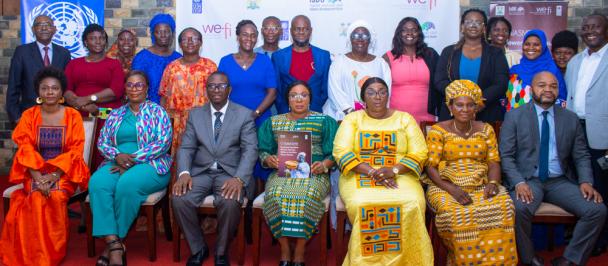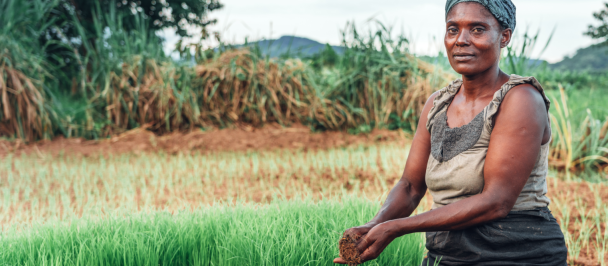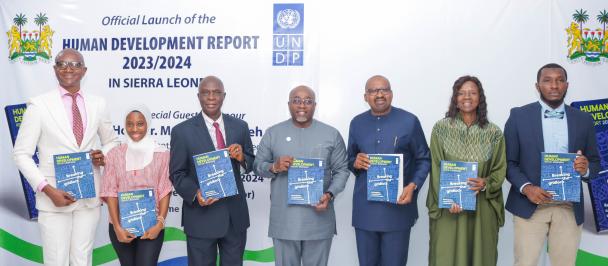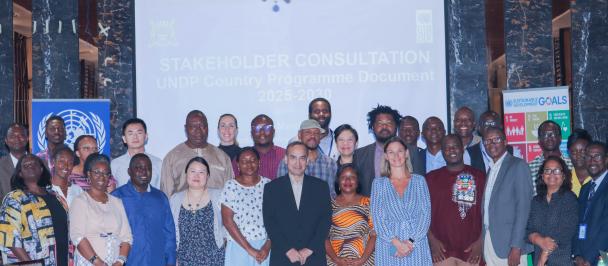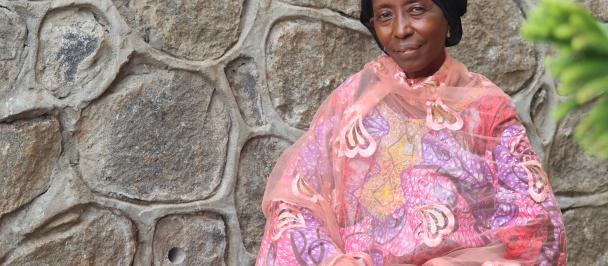Photo showing Hassanatu Bah in her makeshift house and tailoring shop. Photo Credit @UNDP/Mohamed Kanu
Since 2017, 26-year-old Hassanatu Bah never had cause to stop being a seamstress, but, in 2021, the waves of the Covid-19 pandemic hampered her passion for what she has always loved doing-cutting fabrics and sewing them into beautiful garments.
Hassanatu is one of the most popular seamstresses in a small community located in the west end of Freetown. Her customers would never bite their fingers in her makeshift house and tailoring shop. However, a sustained lack of customers during the pandemic crumpled her shop to closure in the face of all odds. This forced her to sell locally produced ‘ginger beer’, a sweetened and usually non-alcoholic beverage, alas, to endure her business shut down and provide for herself.
“I suffered financially but also from lower self-esteem after the business change from being a seamstress to a ginger beer seller,” says Hassanatu.
31-year-old Jacob John is a final year student at the University of Sierra Leone and the owner of Tritech Digital Hub, which he had established to provide printing and photocopy services to schools located in the surrounding communities. Like Hassanatu, Jacob’s business was shut down for three months, the same period when schools were closed. The office space hosting his company was rented through a cooperative. Amidst no coping mechanism, his ability to pay the company’s rent dwindled. Volunteers working at his company were asked to stay home because the company could no longer provide stipends for them.
2020 saw the massive disruption of livelihood opportunities, and many small businesses were not empowered to withstand the shocks of the pandemic. By mid-2021, thousands of small businesses owned by young people were either closed or seriously impacted by Covid-19, leaving them unemployed.
Photo showing Jacob John, owner of Tritech Digital Hub, which he had established to provide printing and photocopying services to schools located in the surrounding communities. Photo Credit @UNDP/Mohamed Kanu
In response, UNDP Sierra Leone, through its partners Restless Development and Institute of Development and Humanitarian Assistance-IDHA, implemented a quick impact project entitled ‘Stabilization and livelihoods enhancement for COVID-19 affected vulnerable communities in Sierra Leone.’
Aimed at supporting youth businesses which closed or significantly scaled down to restart their operations, the quick impact project provided grants to over 1,000 youth-owned businesses in Western Area Rural and Urban Districts, created alternative livelihoods options coupled with training in entrepreneurship and financial literacy.
Several months later, when asked about UNDP’s quick response to the plight of youth, Jacob, with a ray of smile said,
“Thanks to UNDP, my shop has been renovated and my business has grown from just printing and photocopying services to include stationeries and paid-for marketing services. I have also bought a new colored printer which now earns me an additional $15 weekly.”
Now Jacob has employed 1 full-time staff and 5 volunteers, gradually cascading his new skills to his new team of urban youth.
After receiving her grant like Jacob, Hassanatu’s tailoring shop is open again, restoring her self-esteem in her community with a brand-new sewing machine. Her business worth grew from $ 400 to $ 800 in less than two months, and she employed one staff and paid a rent advance for one year. Hassanatu considers herself lucky to have received new business skills together with a grant. Her new business goal is to have a tailoring shop in the central business area of Freetown City, beating the pandemic with an alternative livelihood.
This initiative complements the Government of Sierra Leone Response Plan and Quick Action Economic Recovery Programme in collaboration with the Ministry of Youth Affairs, UNCDF, National Commission for Social Action (NACSA), Ministry of Social Welfare, Freetown City Council, and APEX Bank Sierra Leone.

 Locations
Locations